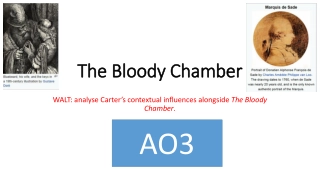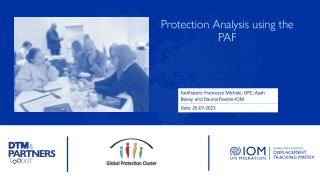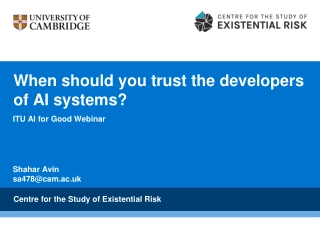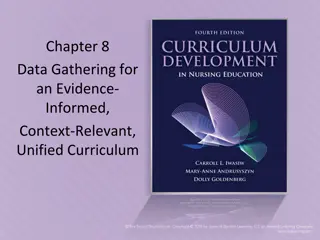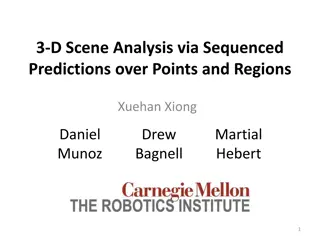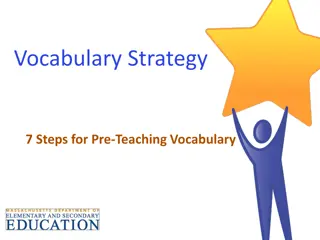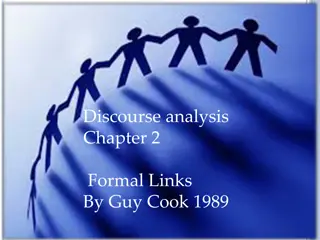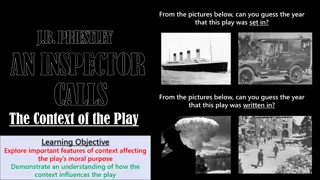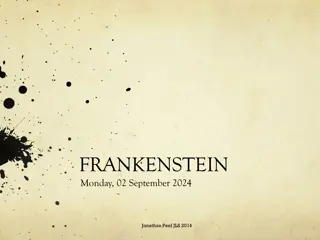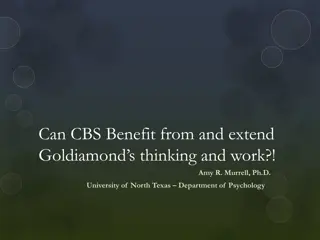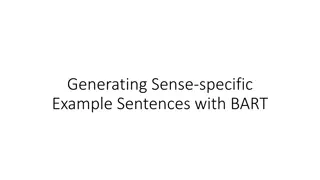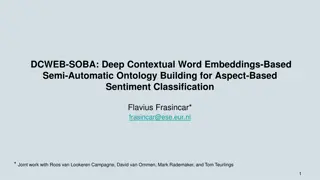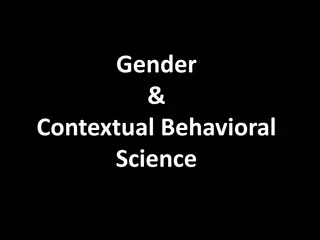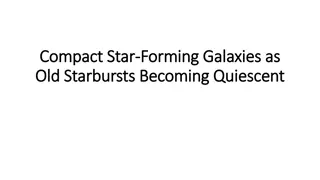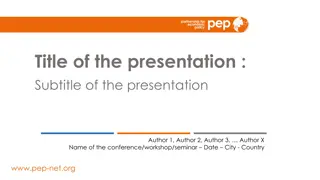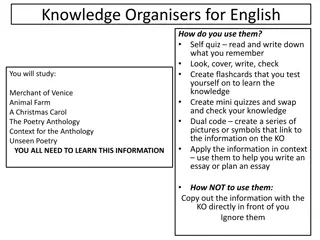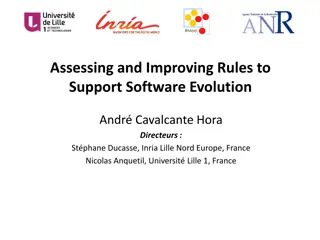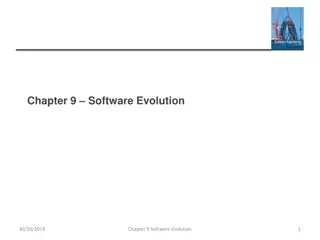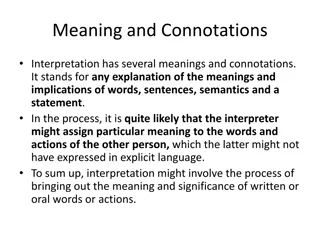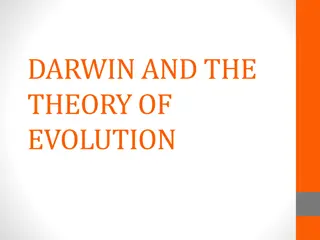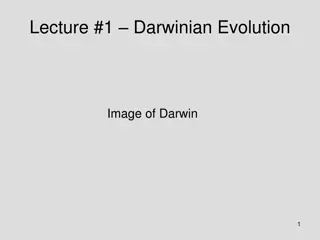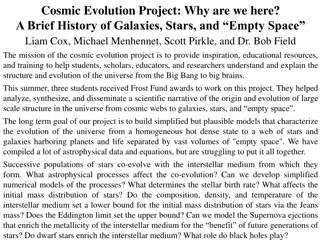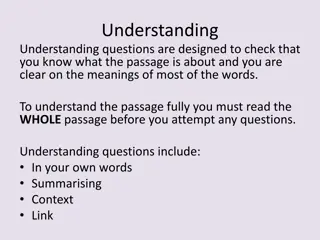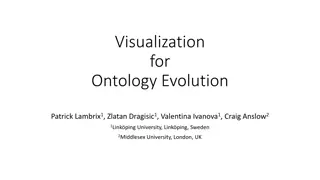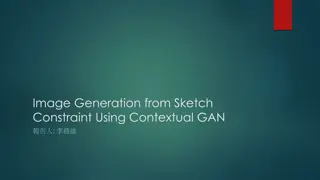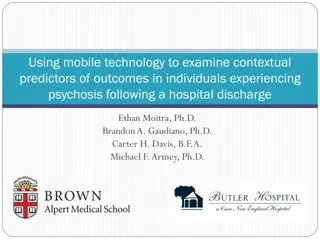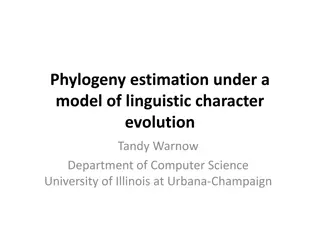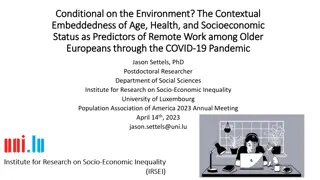Dividing the world of discourse
Explore how contextual dimensions like field, tenor, and mode shape language choices in text production, creating appropriate registers for diverse contexts. Understand why language variations differ in different genres and situations, influencing the coherence and cohesion of texts.
0 views • 14 slides
Evolution of Film Adaptations: From Silent Cinema to Modern Innovations
The moving picture industry emerged in the 1890s, paving the way for adaptations of literary works in the early 1900s. With the advent of sound, a new era of adaptations began, leading to experiments and innovations in modern filmmaking. Adaptation is a process of adjusting and presenting a work in
8 views • 23 slides
Angela Carter and Her Influential Works: A Contextual Analysis
Angela Carter, an English novelist known for her feminist and magical realism works, was influenced by her personal experiences and feminist ideologies. Her notable works include "The Bloody Chamber" and "The Sadeian Woman and the Ideology of Pornography". Carter's unique perspective on women's role
1 views • 26 slides
Protection Analysis using the PAF
In this session, participants will learn how to utilize the Protection Analysis Framework (PAF) and its tools to conduct effective protection analysis. The session covers an overview of PAF, understanding its pillars, and analyzing data to comprehend essential protection concepts. Key points include
5 views • 48 slides
Trusting Developers of AI Systems: When and How?
Trusting developers of AI systems should be based on their demonstrated trustworthiness. The problem lies in the wide range of risks associated with AI, where principles often lack concrete solutions, making compliance verification challenging. Addressing this requires assurance of safety, security,
0 views • 18 slides
Understanding Contextual Factors in Curriculum Development
This chapter delves into the significance of internal and external contextual factors in shaping curriculum development. It discusses the process of gathering essential contextual data, identifying relevant sources, and integrating data to create an evidence-informed, context-relevant, unified curri
5 views • 31 slides
Dissemination of CBS in Low- and Middle-Income Countries
This research project explores the obstacles, successful strategies, and perspectives related to disseminating Contextual Behavioral Science (CBS) in 11 countries across different continents. The study involves conducting interviews with psychologists who disseminate CBS, analyzing the data using th
7 views • 19 slides
Understanding Trauma, Stress, and Behavior: Insights from Research on Growing Up and Promoting Self-Regulation
Explore the impact of trauma, stress, and behavior on individuals through a contextual approach based on research findings. Learn about two types of individuals exhibiting antisocial behavior, the effects of social exclusion on brain function, and the influence of racial discrimination on brain micr
3 views • 20 slides
Advanced Techniques in 3D Scene Analysis for Spatial Understanding
Cutting-edge research in 3D scene analysis focuses on sequenced predictions over points and regions for comprehensive spatial understanding. The approach involves contextual classification, overcoming limitations of classical graphical models through innovative inference machines that prioritize tra
0 views • 40 slides
Effective Pre-Teaching Vocabulary Strategies for ELs
ELs benefit from specific pre-teaching vocabulary strategies such as selecting important words, providing contextual understanding, offering student-friendly definitions, and engaging in oral interactions. Massachusetts Department of Elementary and Secondary Education emphasizes the importance of ch
2 views • 7 slides
Understanding Contextual Safeguarding in Multi-Agency Working
This workshop aims to assist multi-agency practitioners in developing Contextual Safeguarding approaches through team activities and discussions. The session covers partnership working outside the home, the ecological approach of Contextual Safeguarding, and an exercise on creating safety in various
0 views • 26 slides
Understanding Discourse Analysis: Formal Links and Contextual Connections
Discourse analysis involves examining language beyond grammar rules, focusing on formal links within sentences and contextual connections outside of language. Guy Cook discusses how formal features shape discourse meaning and how verb forms influence sentence coherence. The use of parallelism in spe
3 views • 22 slides
Contextual Evolution in J.B. Priestley's Play: An Inspector Calls
J.B. Priestley's play "An Inspector Calls" was set in 1912 but written in 1945, reflecting the significant changes in society between these years. Explore the context and events that influenced Priestley's work, showcasing his socialist views and the impact of historical events like WWI and WWII on
0 views • 12 slides
Understanding Political Theory through a Contextual Approach
Exploring G.H. Sabine's perspective on political theory through a contextual approach, emphasizing the importance of historical context and societal influences. Sabine argues that while political theory evolves with its contemporary politics, it should be analyzed within its specific time and social
0 views • 9 slides
Insights from WJEC A Level English Literature Examiners' Report
Examiners noted candidates' strengths and weaknesses in analyzing poetry pre-1900 and unseen poetry. Candidates lacked confidence in discussing form and contextual influences, but some effectively integrated these aspects. Responses to individual poems were detailed, with contextual focus crucial in
3 views • 18 slides
Exploring Contextual Ideas in Frankenstein by Mary Shelley
An analysis of contextual ideas related to the study of Frankenstein by Mary Shelley. Delve into the key connotations, connections with other literary texts, and the enduring resonance of a novel written almost 200 years ago. Understand the significance of the contexts in which literary texts are wr
0 views • 57 slides
Exploring the Similarities Between Goldiamond's Work and CBS Approaches
Israel Goldiamond's work in professional development, ethics, and behavior analysis shows similarities with CBS approaches, emphasizing contextual factors, functional analyses, and long-term goals. Both approaches focus on understanding behavior within its context and promoting positive change throu
3 views • 5 slides
Motivating Patients on Smoking Cessation: A Contextual Approach Overview
Explore behavioral interventions for smoking cessation, gain insights into effective brief interventions, and learn to apply them using real-world examples. Understand the challenges in tobacco management in primary care and discover common strategies to support patients in quitting smoking. Embrace
0 views • 19 slides
Generating Sense-specific Example Sentences with BART Approach
This work focuses on generating sense-specific example sentences using BART (Bidirectional and AutoRegressive Transformers) by conditioning on the target word and its contextual representation from another sentence with the desired sense. The approach involves two components: a contextual word encod
0 views • 19 slides
Semi-Automatic Ontology Building for Aspect-Based Sentiment Classification
Growing importance of online reviews highlights the need for automation in sentiment mining. Aspect-Based Sentiment Analysis (ABSA) focuses on detecting sentiments expressed in product reviews, with a specific emphasis on sentence-level analysis. The proposed approach, Deep Contextual Word Embedding
0 views • 34 slides
Understanding Gender and Behavioral Science
Exploring the nuances of gender, this content delves into the variance among genders, the impact of gender on behavior, and societal issues related to gender discrimination. It challenges the binary view of gender and highlights the performative spectrum influenced by culture, language, biology, and
0 views • 18 slides
Evolution of Compact Star-Forming Galaxies and Quiescent Galaxies
The evolution of galaxies from compact star-forming to quiescent states involves processes such as secular evolution, gas inflows, and star formation quenching. By studying the structural relations and star formation in these galaxies, insights are gained into their transition towards quiescence. Th
0 views • 12 slides
The Scopes Monkey Trial: Clash of Cultures and Evolution Debate
Following World War I, the Scopes Monkey Trial in Tennessee marked a pivotal clash between urban and rural cultures over the teaching of evolution. The trial, prosecuted by William Jennings Bryan and defended by Clarence Darrow, resulted in teacher John Scopes being found guilty of violating the ant
0 views • 9 slides
Policy Implications of Research on Contextual Factors Affecting Urban Development
Explore the impact of contextual factors on urban development, presenting research findings, policy implications, and recommendations. The presentation covers motivations, research questions, methodology, data analysis, and key findings to aid policymakers in enhancing urban planning strategies.
0 views • 12 slides
Study Guide for "Merchant of Venice" - Key Contextual Information and Analysis Points
Explore the key moments and contextual information of "Merchant of Venice" to enhance your understanding of the play. Delve into themes such as patriarchy, money lending, anti-Semitism, and more. Learn about the significant characters and events, along with analysis points to enrich your interpretat
0 views • 12 slides
Rules and Practices for Software Evolution Support
This content focuses on the importance of rules and practices to support software evolution, addressing challenges, benefits, and impact on ecosystems. It emphasizes the need for system-specific rules, automatic extraction of conventions, and client support. The evolution of software is highlighted
0 views • 65 slides
Software Evolution: Managing Change and Evolution in Organizational Systems
Software evolution is an essential process for organizations to maintain the value of their critical business assets. It involves adapting to new requirements, addressing errors, and enhancing performance. The majority of software budgets in large companies are dedicated to evolving existing systems
0 views • 61 slides
Unveiling the Art of Interpretation: From Textual Meanings to Contextual Significance
Interpretation delves into the meanings and implications of words, sentences, and classical texts, bringing out their significance. It involves decoding complex ideas, separating temporal and perennial thoughts, and revealing contemporary relevance. Different approaches like textual and contextual a
0 views • 18 slides
Ocular to Imaginary Deixis in Greek Epigram
The seminar held at University College London on 16th May 2018 explored the transition from ocular to imaginary deixis in Greek epigrams. It delved into the significance of visual elements in ancient artifacts and inscriptions, shedding light on the evolution of contextual meanings within Greek art
0 views • 8 slides
Darwin and the Theory of Evolution: A Comprehensive Overview
Darwin's Theory of Evolution encompasses the concepts of organisms changing over time and life evolving through natural selection. Influenced by scientists such as James Hutton, Jean Baptiste Lamarck, and Alfred Russel Wallace, Darwin's theory culminates in the idea of evolution by natural selection
0 views • 9 slides
Understanding Evolution: Key Concepts and Perspectives
Explore the concepts of Darwinian evolution, evidence for evolution, Darwin's theory, and the Modern Synthesis. Delve into the spiritual versus intellectual perspectives, the diversity of religious affiliations globally, and the compatibility of faith and science in understanding the natural world a
0 views • 91 slides
Unveiling the Cosmic Evolution: A Journey Through Galaxies, Stars, and Empty Space
Delve into the intricate story of the universe's evolution from its hot dense origins to the vast cosmic web of stars and galaxies. Explore questions on stellar birth rates, interstellar medium influences, and the role of dark energy. Follow the journey of three students working on the Cosmic Evolut
0 views • 30 slides
Techniques for Passage Comprehension
Techniques such as understanding, summarizing, and contextual analysis are essential for effective passage comprehension. In your own words, summarizing key points, and deciphering contextual questions play a vital role in grasping the content fully. By utilizing these methods, you can enhance your
0 views • 46 slides
Understanding Evolution: Key Concepts and Perspectives
Explore the key concepts of Darwinian evolution, including evidence for evolution, Darwin's theory, and the Modern Synthesis. Reflect on the relationship between spiritual and intellectual perspectives, emphasizing that different ways of thinking can complement each other. Discover the diversity in
0 views • 91 slides
Visualizing Ontology Evolution for Improved Knowledge Management
Ontologies are dynamic entities that evolve over time, impacting semantically-enabled applications and knowledge acquisition. This work focuses on identifying desired functionalities for ontology evolution systems, highlighting the steps involved in ontology evolution, and emphasizing the importance
0 views • 16 slides
Contextual GAN for Image Generation from Sketch Constraint
Utilizing contextual GAN, this project aims to automatically generate photographic images from hand-sketched objects. It addresses the challenge of aligning output with free-hand sketches while offering advantages like a unified network for sketch-image understanding. The process involves posing ima
0 views • 21 slides
Contextual Predictors of Psychosis Outcomes Post-Hospital Discharge
This study explores predictors of outcomes in individuals with psychosis post-hospital discharge using mobile technology. It addresses treatment nonadherence, the impact of antipsychotics, psychological flexibility, and the use of ecological momentary assessment (EMA). The research highlights the cr
0 views • 27 slides
Evolution of Indo-European Languages through Phylogeny Estimation
Explore the evolution of Indo-European languages through phylogeny estimation under a model of linguistic character evolution. Follow the Computational Historical Linguistics Project's collaboration that began in 1994, leading to the development of methods and studies on homoplasy-free evolution and
0 views • 61 slides
Conditional on the Environment? The Contextual Embeddedness of Age, Health, and Socioeconomic Status as Predictors of Remote Work among Older Europeans through the COVID-19 Pandemic
This study delves into how the COVID-19 pandemic has influenced remote work patterns among older Europeans, focusing on the interaction between age, health, socioeconomic status, and contextual factors. It explores the impact of government restrictions, education, income, age, and health on the abil
0 views • 24 slides
Importance of Contextual Lead-Ins in Incorporating Quotes
When incorporating quotes in your SAR or body paragraph, it's crucial to provide a contextual lead-in. This means introducing the quote with a summary derived from the text itself. Examples from Bradbury's work illustrate how contextual lead-ins enhance the understanding and relevance of quoted pass
0 views • 6 slides


